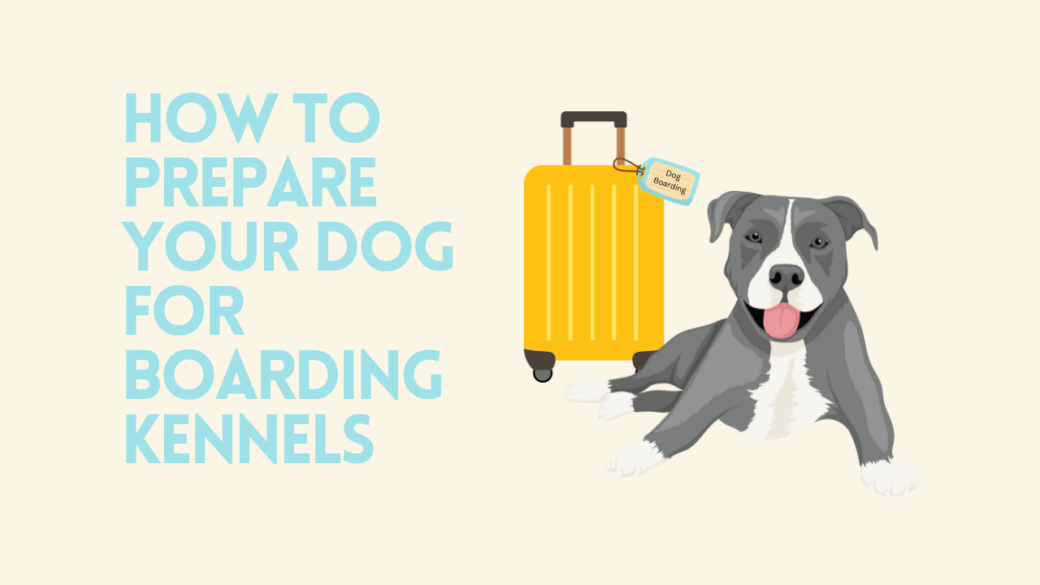Putting your dog in a boarding kennel for the first time can be a daunting experience, especially if this is a first for you, too. Not knowing what to plan ahead for or what to expect causes unnecessary stress for pet owners, but a bit of research can help ease that uncertainty. This is on top of leaving your four-legged friend in someone else’s care, too.
Thankfully, to ensure dog owners are properly prepared, this article includes the best steps to follow when putting your dog in a boarding kennel for the first time, including when to book a kennel and what to bring when dropping your dog off. With this information, the first experience of boarding kennels will be a breeze for you and your dog.
Table of Contents
10 Steps for Putting Your Dog in Kennels for the First Time
Boarding kennels can be a stressful experience for not only the dog but its owner, too. This is why preparation must be carried out when a stay in boarding facilities is required; it can not only make the situation simple, but it can also ease the anxiety both you and your dog will be feeling.
The ten steps listed below should be followed to ensure the experience is simple.
1. Plan Ahead in Plenty of Time
Dog boarding kennels can be busy when schools are closed for the summer and during peak holiday seasons. This means that booking your dog into a boarding facility must be done ahead of time to avoid missing out on a place, especially if you are unable to use a pet sitter.
When you know which dates your dog will require boarding, begin looking as soon as possible. Ideally, this will be at least one or two months before the chosen dates and not a last-minute booking. A few kennels will not accept bookings at the last minute due to the preparation they need to carry out before new dogs arrive.
Of course, there will be times when dog owners need to book their pets into boarding kennels at short notice, such as funerals or hospital stays; your pet insurance policy might cover the latter. If a friend or family member cannot look after your pets during these times, and you do not want to use a pet sitter, then finding a good boarding kennel can be a suitable choice.
2. Choose a Reputable Boarding Facility
Like many other services, the professionals are the best for a reason. Dog boarding facilities must be licensed and follow guidelines set out by the government in The Animal Welfare Act; if they do not meet these conditions, the dog owner should avoid using that kennel.
Before selecting a boarding kennel, be sure to do your research and ask staff members the right questions, like those listed below:
- Can I visit the facility with my dog before booking?
- Are the boarding staff trained to handle dogs correctly?
- Do I need to book in advance? (If yes, how far in advance do they recommend?)
- Which vaccinations do they require?
- Will my dog fit in the kennel unit?
- How often will my dog be walked?
- How do staff interact with the dogs in their care?
- Do you supply dog food during the dog’s stay? (If yes, which brands?)
- Does the kennel offer home boarding?
If the kennel staff can answer all of these questions to your satisfaction, you can proceed with this chosen facility.
3. Be Honest About Your Dog’s Behaviour and Personality
To ensure your dog receives the correct care and the kennel staff are properly prepared, it is vital to honestly describe your pet’s behaviour and personality, especially if your dog has behavioural issues. Anxious and reactive dogs can require staff members with experience handling these types of dogs, and some boarding facilities will be able to adapt the kennel for the dog’s stay, such as placing the dog in an area with less foot traffic, offering additional exercise time, etc. If they cannot handle your dog’s needs, then look for different dog boarding kennels.
This is not limited to only reactive dogs. As other dogs find boarding extra stressful, their behaviour can change when kept in a new environment. If you let the kennel staff know how your dog normally behaves, they can monitor for changes and act accordingly. For first-time boarders, separation anxiety is a possibility, especially if the dog has never been without its owner before.
Similarly, if you own a puppy or an elderly dog, you should be upfront about their care needs. Puppies and senior dogs can need extra attention at times, whether this is more meals throughout the day or additional interaction with the staff. By alerting the boarding kennel of the needs and behaviour of your dog, they can be better prepared to care for the dog.
4. Check the Facility Caters to Your Dog’s Diet and Medication
Many dog boarding establishments will provide food as part of the cost. When they offer this, they will have a selection of dog food brands and types to choose from. However, in some kennels, the pet owner will need to provide the food for the duration of their dog’s stay; this is more common when the dog eats a special diet or has food allergies.
If you do have to provide dog food, to ensure the dog food stays fresh and is clearly marked for your dog, ensure your dog’s own food in a re-sealable container or individual sandwich bags. You should also leave instructions on how much kibble to feed the dog and when mealtimes should be. If the kennel also requires you to bring a food bowl, mark the dog’s name on this, too.

Catering to a dog might also require administering medication. Again, if your dog needs medication regularly throughout its stay, make the boarding kennel aware of this beforehand and provide clear instructions on the dosage, when to administer it, and so on. Unfortunately, not all staff members will be trained to give medication, but most kennels will cater to this.
If the dog boarding facility passes steps one to four, then it is still to begin preparing your dog for its stay in the kennel.
5. Get the Dog Health Checked
Once you have chosen a reputable boarding kennel for your dog, you should ensure your dog is health-checked by a vet and its vaccinations are up-to-date. The routine vaccinations required should be discussed when first contacting the boarding kennels.
To ensure your pet’s health is protected during boarding, dogs will require up-to-date vaccinations (at least one week before boarding) protecting them from:
- Distemper
- Hepatitis
- Kennel Cough
- Leptospirosis
- Parvovirus
Proof of these vaccinations will be required, so bring the vaccination card with you when dropping your dog off at the boarding establishment.
Vets will also check the general health of animals before they are put in boarding kennels. Although most dogs are given preventative treatment for worms, fleas, and ticks, parasites can still be a problem for boarding facilities; your vet might insist upon double-checking that your dog is clear before its planned stay.
6. Plan a Visit with Your Dog
If this is your dog’s first boarding experience, it could be a stressful time, but visiting the boarding kennel could help lessen this anxiety. A good sniff around the premises will familiarise the dog with its surroundings before the planned stay. Thankfully, most reputable dog kennels will allow visits before the dog’s stay; in fact, alarm bells should sound if they do not allow your dog to visit beforehand. This can sometimes signal that the establishment does not align its practices with The Animal Welfare Act.
During the visit, you should be able to check the individual kennels, see where dogs get their regular walks and exercise, and view the dogs currently staying in the boarding kennel. Pet owners should be on the lookout for potential issues when visiting a boarding kennel, such as:
- How noisy the kennels are
- If the kennels smell unpleasant
- The standard of dog accommodation
If the kennel also offers cat boarding, you should check how this affects the dogs. Both cats and dogs should not be able to see each other if the boarding kennel offers both, as the very sight can cause stress for either animal.
7. Update Identification and Microchip Records
Unfortunately, it is possible for dogs to go missing, even when kept in a good boarding kennel. Some dogs will dig under or jump over fences in the exercise area of the property or get loose during a dog walk. If this happens, it is essential that all identification records are updated and checked to ensure the dog gets back home when found.
The correct contact details for the dog owner should be listed on the ID tag on the dog’s collar and in the records for the dog’s microchip. Microchipping has been compulsory for dogs since April 2016.
8. Begin Crate Training
Boarding your dog means they will be kept in one area for a certain amount of time, with breaks for exercise and enrichment. Some dogs can feel more comfortable in enclosed, personal spaces, like dens, and crates can be a great way of creating this safe area. However, not all dog owners will have thought to crate-train their dogs, which can cause some issues when it comes to boarding a dog.
Crate training your dog before the planned stay in a boarding kennel can help ease the stress and uncertainty of the experience. This is because the dog will begin to feel comfortable in its own space, will adapt easily to the boarding situation, and will be less likely to suffer from separation anxiety. Your chosen boarding kennel might even allow your pet’s crate to be put inside the kennel unit to add more familiarity.
For tips on crate training, check out this video below:
9. Pack Your Dog’s Favourite Items
Along with the essentials, such as the dog’s lead, food, food bowl, and medication, dog owners should also pack some of their pet’s favourite toys and a blanket or bed to make the new surroundings more comfortable. The kennel might have a limit on how many items each dog can have, but anything that is allowed should be labelled with the dog’s full name to ensure nothing is misplaced.
These items will likely bring the dog a lot of comfort during its first night in the kennel, especially if some smell like the owner; this is why some dog owners will supply an old t-shirt during kennel stays.
Some of the pet’s favourite treats could be added to their belongings for enrichment. These treats could be used as boredom breakers or training aids when the kennel staff interact with the dog, making its stay more enjoyable.
10. Ask for Regular Updates
Despite most of this preparation is for the dogs, dog owners will also deal with their own anxiety over leaving behind their furry friends. It can be a difficult experience, leaving the dog in someone else’s care for days or even weeks at a time. Boarding kennels can offer regular updates to help them go off on holiday and have a wonderful time, knowing their pets are well cared for.
There are good kennels that provide photo updates of dogs staying on the premises, and some can even set up live streams of the kennels that dog owners can log into to check up on their pets. You can ask what type of updates your chosen kennel offers and leave instructions on how often to update and what information to include. This should help you have peace of mind.
After Collecting Your Dog from Boarding Kennels: Additional Advice
Although the excitement of having your dog back home can be overwhelming, this can be another difficult transition for some dogs, especially after being kept in kennels for the first time.
Get Back to the Normal Routine
Once your dog is home, getting back to its usual schedule is crucial. Some dogs will display unwanted behaviours after a boarding stay, such as chewing, clinginess, or urinating indoors, and getting back to the normal routine can prevent this. It can take a few days or even a week for the dog to become more settled at home, so patience is crucial during this time.
As a dog owner, you might want to make your dog as comfortable as possible and give in to every whine, but this can cause more trouble. You must stick to your routine so the dog becomes accustomed to being at home once more. Take the dog out for walks, feed the dog, and do whatever else you usually would.

Allow Time for Rest
Your dog might appear tired after coming home from a boarding kennel; this is normal to an extent. Each dog will have been exercised at least twice daily during its stay at the kennel, and the stress of being somewhere new will have also eaten away at the dog’s energy levels. To give them time to rest and recuperate, try to avoid getting your dog too excited by making a big fuss and instead allow it short periods of alone time.
If the dog continues acting more lethargic than normal or worsens, contact your vet to book a check-up.
Monitor the Dog’s Appetite and Bowel Movements
Stress can affect a dog’s hunger levels and bowel movements, causing it to eat less than it usually would. Although this might be more common during a boarding stay, it is not unheard of for dogs to struggle when they return home. Due to the excitement of being reunited, some dogs will have diarrhoea after a stay in boarding kennels.
Again, if the dog’s dietary and toileting habits do not return to normal after a few days, it might be a good idea to check with a vet.
To Sum Up
When putting your dog in kennels for the first time, there is much to plan for a dog owner. It can seem like a lot of work to begin with, contacting different facilities and having the same conversations over and over again. However, ensuring your dog is happy and well cared for while you are away is all worth it. The ten steps listed in this article can help you almost guarantee just that.
Of course, dog kennels will not be suitable for all dogs, but this can only be determined by going through the process in the first place. If, for any reason, you believe dog boarding kennels are not the right choice for your pet, you don’t have to use them, but they can be a good option at times.
So, if your friends and family members are unable to watch your dog, and there are no pet sitters available in your area, using a reputable boarding kennel is a good idea. It can seem daunting the first time, but it can be a simple experience with the correct preparations.

